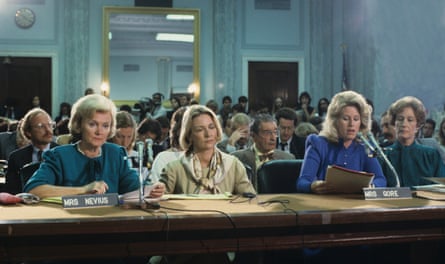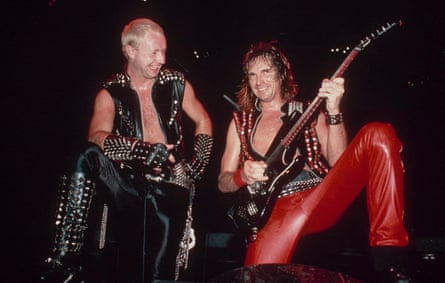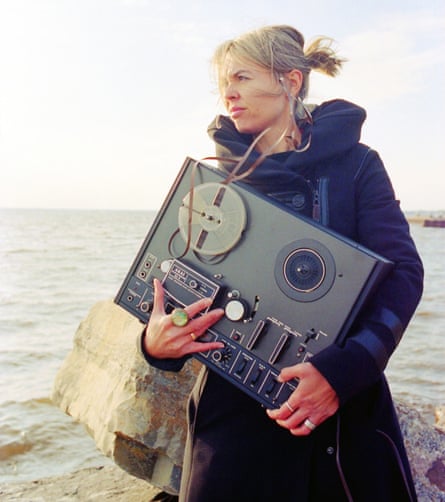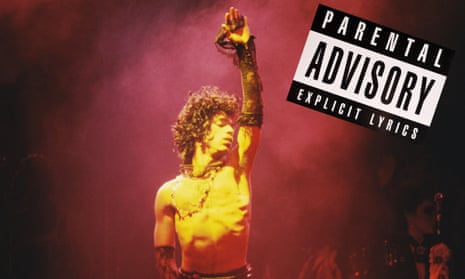‘First, I was stunned, then I got mad!” That’s how Mary “Tipper” Gore – wife of American senator Al Gore – described the experience of buying Prince’s mega-selling Purple Rain album for her 11-year-old daughter, and listening to it with her. Mrs Gore’s rage was triggered by the track Darling Nikki, which begins: “I knew a girl name Nikki / Guess you could say she was a sex fiend / I met her in a hotel lobby / Masturbating with a magazine.”
Along with other wives of powerful American politicians, in 1985 Gore founded the PMRC – Parents Music Resource Center – to campaign for stronger censorship in music. The initial list of songs they considered “most offensive” – dubbed the Filthy 15 – included some of pop’s biggest names. Prince had the top two entries – the other was Sugar Walls, written for Sheena Easton. Madonna’s mildly spicy Dress You Up was less explicably included. Many songs given the black spot were heavy metal – the multi-million selling likes of Black Sabbath, AC/DC, Def Leppard and Judas Priest.
The furore went to the Senate and resulted in the “Parental advisory: explicit lyrics” sticker many of us grew up with. Meanwhile, 800 miles away in Canada, 12-year-old metal fan Nicole Lizée watched the televised hearings aghast. “I loved a lot of the artists in the Filthy 15 and I couldn’t imagine someone telling me that I couldn’t listen to them without my parents’ say-so,” she remembers. “It was ridiculous.”

Today, that distraught pre-teen is now an internationally renowned contemporary/classical composer, whose latest work takes a revenge on the PMRC for which she has waited 33 years. Lizée promises that The Filthy Fifteen – a mix of electronics, glitches, visuals, narrative and music, performed by percussionist Joby Burgess AKA Powerplant, which shows at London’s Barbican next month – will be “finger-pointing, lampooning, and seriously transgressive”.
It includes the voice of the PMRC’s Susan Baker describing how Prince’s “terrible song” would corrupt her friend Tipper’s daughter. “So I put her voice through a synthesiser and made a groove out of it,” Lizée chuckles. Elsewhere, she takes incredible footage of Senator Paula Hawkins holding up Def Leppard’s album Pyromania before the Senate committee and saying: “The message is clear. Burn the building! Burn, baby, burn!” and turns it into what she gleefully calls a “fun singalong”.
“You know, they really thought that Def Leppard were about burning stuff. Aged 12, I loved that band. And I burned very little, I have to say.”
Lizée’s show is timely because pop is still the subject of moral panics, drill music recently being blamed for knife crime. Lizée says that she wanted people to think, “Did that really happen?” about the PMRC but also argues that such suppression is “the origin of things still going on today”.

Pop has long run into trouble with the censors. Elvis Presley was famously filmed from the waist up on the Ed Sullivan show in 1956 because it was feared that his gyrating pelvis would pervert the nation’s youth. But the PMRC went further, making demands ranging from “offensive” albums to be sold under the counter to X-ratings for certain concerts. Stars such as Frank Zappa and John Denver railed against artistic suppression at the hearings, but not before the so-dubbed “Washington wives”, with powerful access to legislators, had sent tremors through the music industry.
“It was terrifying, really. You think, ‘How far is this going to go?’” remembers Judas Priest founding guitarist KK Downing, whose song Eat Me Alive was in the 15. Gore told the Senate that singer Rob Halford’s lyrics – about a “rod of steel” and “groan in the pleasure zone” – advocated “oral sex at gunpoint”. The band responded with a defiant answer song, Parental Advisory, but the guitarist admits that he did momentarily wonder: “Have we gone too far? But we were a metal band. We didn’t sing about daffodils and roses.”

The furore took on a darker aspect when two sets of parents sued Judas Priest, alleging that subliminal messages on the album Stained Class incited their children to attempt suicide – one fatally. “Seeing the photos in court was horrifying,” Downing says, “but we’d already faced protests outside gigs in the Bible belt. We’d become a target for religious movements.”
The case – along with a similar one against Ozzy Osbourne – was unsuccessful, and today Lizée is incredulous that pop music is still linked with disturbed behaviour. “Listening to Mötley Crüe didn’t make me sell my soul to Satan or kill people.” In fact, the music, which was “scary and exciting, and stirred up emotions and imagination”, was her gateway to the arts.
It wasn’t easy to be a pre-teen headbanger in a Saskatchewan prairie town. Lizée’s peers ridiculed her Metallica jump suit (“Later, when Guns N’ Roses made metal more cool, they all wanted to borrow it) and her parents disapproved of her posters of a blood-spattered Mötley Crüe. But her mother – who was perhaps aware of what the censors did to her beloved Elvis the Pelvis – stopped short of confiscation.
“I was given talks every so often. ‘Why don’t you listen to something … nicer?’ I had to turn the volume down whenever there was profanity, which was often.”
The PMRC categorised the 15 according to the type of outrage created by the lyrics. Mötley Crüe’s Bastard was rated “violence”. Cyndi Lauper’s She Bop (in which she sings of “picking up good vibration”) came under “sex, masturbation”. Mercyful Fate’s Into the Coven (in which the hard-rocking Danes urge, “Come into my coven and become Lucifer’s child!”) was declared “occult”. The band argued that their work was entertainment and no different to horror movies. Lizée points out her religious upbringing saw her exposed to far more disturbing imagery: “I watched movies showing Jesus nailed to the cross, being whipped constantly.”
Her favourite Mötley Crüe album was Shout at the Devil, which supposedly contained Satanic backwards messages. So one night she and her brother played the casette backwards. “I pressed rewind and play at the same time and this horrible noise came out. He went, ‘Oh my God. That’s Satan!’” she laughs. “It was actually the tape warping and screaming. Later we realised that there weren’t Satanic messages at all. It was all hype.”
Lizée first tackled censorship with 2016’s award-winning Bookburners, her aural lament for public incinerations of books and records. Even the Beatles had their music torched in public after John Lennon’s infamous “We’re bigger than Jesus” remark. “But because of digital, you can’t do that any more,” Lizée explains. “You can delete it or cancel the streaming service or whatever, but back then it was such a passionate ceremony. As wrong and ridiculous as it was, I found it fascinating.”
Powerplant’s Joby Burgess had been fascinated by Lizée’s work since 2011’s Hitchcock Études (snatches of the director’s films made into a giant loop) and the pair bonded over metal. Burgess was a Crüe fan – and listened to Zappa in his teens. He’s now a father, “and yes I do worry about the lasting damage to my children caused by Little Mix,” he says, drily. “But you don’t want your parents to say, ‘Great record!’ You want something that’s your own, and that’s so important.”
For The Filthy Fifteen, the pair assembled drums, a record player, a typewriter, an electric guitar played with brushes, ripped paper and a vibraphone smothered in chains to create a sensorial collage that Lizée calls “the sound of censorship”. She’s particularly proud of a recording they found of psychiatrist Dr Fredric Wertham in 1954, telling another Senate committee that comic books are responsible for juvenile delinquency.
The PMRC won a battle but lost the war. Although some stores initially refused to stock stickered albums, gangsta rap opened the profanity floodgates and the stickers actually became a selling point to kids like Lizée, who “really wanted to hear these records”.
Of the original 15, only WASP’s deathless Animal (Fuck Like a Beast) now carries an “explicit” rating on Spotify. Lizée thinks that the Washington wives were sincere – “genuinely frightened of these records” – but misguided. “I wonder if they realise how much they were in a bubble and how ridiculous and illogical they were,” she says. “They were attacking some of our greatest artists.”
The Filthy 15
- Prince – Darling Nikki (sex, masturbation)
- Sheena Easton – Sugar Walls (sex)
- Judas Priest – Eat Me Alive (sex)
- Vanity – Strap On Robbie Baby (sex)
- Mötley Crüe – Bastard (violence/language)
- AC/DC – Let Me Put My Love Into You (sex)
- Twisted Sister – We’re Not Gonna Take It (violence)
- Madonna – Dress You Up (sex)
- WASP – Animal (Fuck Like a Beast) (sex)
- Def Leppard - High ’n’ Dry (Saturday Night) (drug and alcohol use)
- Mercyful Fate – Into the Coven (occult)
- Black Sabbath – Trashed (drug and alcohol use)
- Mary Jane Girls – In My House (sex)
- Venom – Possessed (occult)
- Cyndi Lauper – She Bop (sex/masturbation)

Comments (…)
Sign in or create your Guardian account to join the discussion